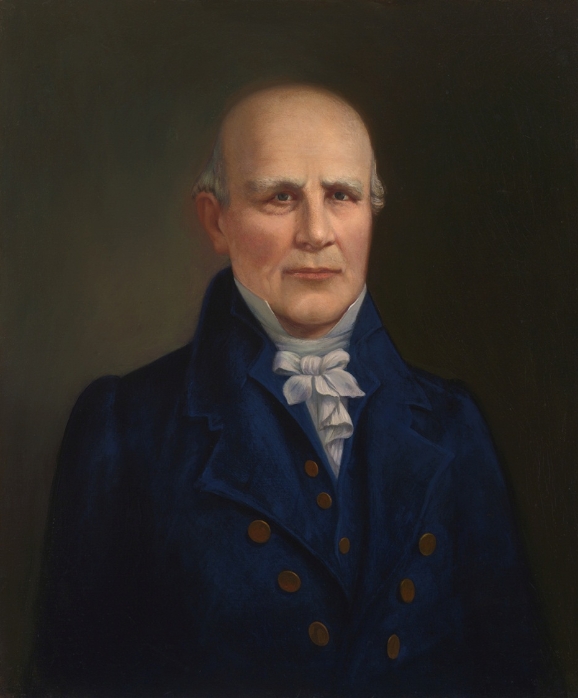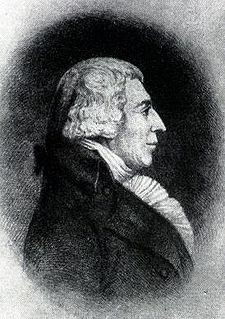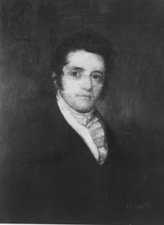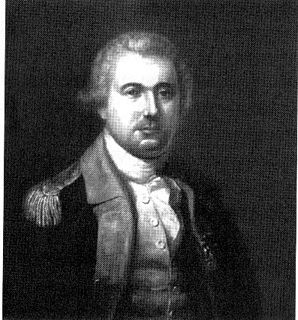John Long (February 26, 1785 – August 11, 1857) was a North Carolina politician who served four terms (1821–1829) in the U.S. House of Representatives.

North Carolina is a state in the southeastern region of the United States. It borders South Carolina and Georgia to the south, Tennessee to the west, Virginia to the north, and the Atlantic Ocean to the east. North Carolina is the 28th-most extensive and the 9th-most populous of the U.S. states. The state is divided into 100 counties. The capital is Raleigh, which along with Durham and Chapel Hill is home to the largest research park in the United States. The most populous municipality is Charlotte, which is the second-largest banking center in the United States after New York City.
Long also served one term (1811–12) in the North Carolina House of Commons and one term (1814–15) in the North Carolina Senate.

The North Carolina Senate is the upper chamber of the North Carolina General Assembly, which along with the North Carolina House of Representatives—the lower chamber—comprises the legislature of the North Carolina.
John Long was born in Loudoun County, Virginia on February 26, 1785. He married Sabra Shepard Ramsey on May 6, 1807, in Cumberland County, North Carolina. Long died on August 11, 1857.

Loudoun County is a county in the Commonwealth of Virginia in the United States. In 2017, the population was estimated at 398,080, making it Virginia's third-most populous county. Loudoun County's seat is Leesburg. Loudoun County is part of the Washington–Arlington–Alexandria, DC–VA–MD–WV Metropolitan Statistical Area.

Cumberland County is a county located in the U.S. state of North Carolina. As of the 2010 census, the population was 319,431, making it the fifth-most populous county in North Carolina. Its county seat is Fayetteville.
This page is based on this
Wikipedia article Text is available under the
CC BY-SA 4.0 license; additional terms may apply.
Images, videos and audio are available under their respective licenses.

Lexington is the largest town in and the county seat of Lexington County, South Carolina, United States. Lexington is a suburb of the state's capital and second-largest city, Columbia. The U.S. Census Bureau estimated 2017 population is 21,265, and it is the second-largest municipality in the greater Columbia area.

Nathaniel Macon was an American politician who represented North Carolina in both houses of Congress. He was the fifth Speaker of the House, serving from 1801 to 1807. He was a member of the United States House of Representatives from 1791 to 1815 and a member of the United States Senate from 1815 to 1828. He opposed ratification of the United States Constitution and the Federalist economic policies of Alexander Hamilton. Thomas Jefferson dubbed him "Ultimas Romanorum"—“the last of the Romans”.

The State of Franklin was an unrecognized and autonomous territory located in what is today East Tennessee, United States. Franklin was created in 1784 from part of the territory west of the Appalachian Mountains that had been offered by North Carolina as a cession to Congress to help pay off debts related to the American War for Independence. It was founded with the intent of becoming the fourteenth state of the new United States.
George Wayne Goodwin is a North Carolina politician and current chair of the North Carolina Democratic Party. He was elected North Carolina Commissioner of Insurance in the 2008 election and re-elected in 2012. He was narrowly defeated in his bid for a third term in 2016. However, he quickly rebounded and was elected on February 11, 2017 as Chairman of the North Carolina Democratic Party on the first ballot with 92% of the vote among four candidates.

Hutchins Gordon Burton was the 22nd Governor of the U.S. state of North Carolina from 1824 to 1827. Some sources indicate that he was not affiliated with any party at the time, although he was associated, according to other sources, with the Federalist Party and later with the National Republican Party.

Benjamin Williams was the 11th and 14th Governor of the U.S. state of North Carolina, from 1799 to 1802 and from 1807 to 1808. He was the first of two North Carolina Governors since the American Revolution to serve nonconsecutive terms.

Richard Dobbs Spaight was the eighth Governor of the U.S. state of North Carolina from 1792 to 1795.:

William Hall was an American politician who served as the seventh Governor of the state of Tennessee from April to October 1829.

Gabriel Moore was a Democratic-Republican politician and fifth Governor of the U.S. state of Alabama (1829–1831).
Absalom Tatom was a U.S. Congressman from North Carolina from 1795 to 1796.
Richard Clauselle Puryear was a U.S. Congressman from North Carolina between the years of 1853 and 1857. A planter and politician, he also served in the North Carolina House for several terms and the state senate.

Rufus A. Doughton (1857–1946) was a member of the North Carolina General Assembly from Alleghany County, North Carolina and Speaker of the state House of Representatives for one term (1891).

Major John Patten was a United States farmer and politician from Dover, in Kent County, Delaware. He was an officer of the Continental Army in the American Revolution, a Continental Congressman, and a member of the Democratic-Republican Party, who served in the Delaware General Assembly and as a United States Representative from Delaware.

Edward W. Stanly was a North Carolina politician and orator who represented the southeastern portion of the state in the United States House of Representatives for five terms. In 1857, Stanly ran for Governor of California, but lost to John B. Weller. Politicians of the mid-nineteenth century remarked that Stanly bore a strong physical resemblance to William H. Seward, though this resemblance lessened over time.

Abraham Rencher was a politician from the state of North Carolina. His career included: Congressman; Chargé d'affaires to Portugal; and Governor of New Mexico Territory.
The Supreme Executive Council of the Commonwealth of Pennsylvania comprised the executive branch of the Pennsylvania State government between 1777 and 1790. It was headed by a president and a vice-president. The best-known member of the Council was Benjamin Franklin, who also served as its sixth president.

Events from the year 1785 in the United States.
William Cage was a politician in North Carolina and Tennessee and an early settler in Tennessee. He was a member of the North Carolina House of Representatives in 1783 and 1784. He briefly held the position of State Treasurer and Speaker of the State House of Representatives in the 18th century, from August 1784–June 1785, representing the proposed State of Franklin.
The Wayne County Regiment was a unit of the North Carolina militia that served during the American Revolution. The North Carolina General Assembly created Wayne County and its regiment of militia out of part of Dobbs County and its regiment of militia on November 2, 1779. The officers were appointed and commissioned by the Governor of North Carolina. The regiment was disbanded at the end of the war.
















